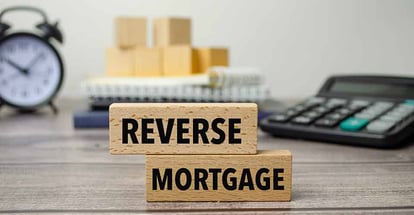Unlocking Reverse Mortgage Tax Benefits: Ultimate Guide
Are you over the age of 62? Then you may want to consider unlocking the reverse mortgage tax benefits available to you. Reverse mortgages offer an array of tax and financial benefits — from eliminating some monthly expenses, freeing up cash flow, deferring taxes until later and potentially receiving a higher Social Security benefit.
As increasing numbers of borrowers learn about these possibilities and become aware that they have access to them, it’s important to understand what kind of financial resources are available if you go down this route.
So if you’re considering a reverse mortgage — or already have one in place — we invite you to read on through this ultimate guide so that you can maximize your income potential while also reducing your taxation obligations significantly!
What Is a Reverse Mortgage?
A reverse mortgage is a financial option available to homeowners who are aged 62 or older and have substantial equity in their homes.
Unlike a traditional mortgage, where you borrow money from a lender and make monthly payments, with a reverse mortgage, the lender pays you a one-time lump sum, monthly installments, or provides a line of credit.
This money can be used for basic living expenses, medical bills, and more. What sets a reverse mortgage apart is that you don't have to make monthly payments to repay the loan. Instead, the loan becomes due when you sell the home, move away, or pass away.
One of the benefits of a reverse mortgage is that the money you receive is generally not taxable and does not impact your Social Security or Medicare benefits.
It provides homeowners with a way to tap into their home equity without incurring immediate tax implications or affecting their existing benefits.
Reverse Mortgage Benefits
Many Americans don’t understand that in 2023, the reverse mortgage industry is highly regulated.
Reverse mortgages are a powerful financial tool that many people over the age of 62 don’t understand they have access to. In this section we’ll be covering the benefits.
Eliminating Some Monthly Expenses
A reverse mortgage can provide a valuable opportunity for retirees to eliminate monthly mortgage payments and reduce their monthly expenses.
For many seniors on fixed incomes, mortgage payments can be a significant financial burden that affects their ability to cover other essential expenses such as healthcare, groceries, or utilities.
By obtaining a reverse mortgage, which allows homeowners aged 62 and older to convert a portion of their home's equity into loan proceeds, borrowers can use the funds to pay off their existing mortgage, effectively eliminating the need for monthly mortgage payments.
This can have a significant positive impact on a retiree's budget, as it frees up money that would otherwise be allocated towards mortgage payments.
This additional cash flow can be used to cover day-to-day living expenses, invest in other opportunities, or simply enjoy a better quality of life in retirement. It can provide much-needed financial relief, especially for those with limited income sources or facing financial challenges.
Moreover, the elimination of monthly mortgage payments can provide retirees with greater financial stability and peace of mind.
It can reduce the risk of falling behind on mortgage payments or facing foreclosure due to financial constraints, which can be particularly stressful for seniors on fixed incomes.
By eliminating this financial obligation, a reverse mortgage can help seniors better manage their monthly expenses and have more control over their financial situation in retirement.
Freeing Up Cash Flow
A reverse mortgage can offer seniors the option to access a lump sum of cash or a line of credit, providing greater financial flexibility and freedom.
This can be especially valuable for retirees who may face unexpected expenses or wish to pursue other opportunities during their retirement years.
With a lump sum payment, borrowers can receive a one-time payout of a portion of their home's equity, which can be used to cover various expenses such as medical bills, home repairs, or travel expenses. This can provide a financial safety net and alleviate financial stress during times of unexpected financial need.
Similarly, a line of credit from a reverse mortgage acts as a flexible source of funds that can be accessed as needed.
Borrowers can choose to access funds from the line of credit when required, allowing them to have funds available for emergencies or to take advantage of investment opportunities.
This can provide a valuable financial cushion and enhance retirees' ability to manage their financial needs and goals.
The availability of cash through a reverse mortgage can also enhance the overall quality of life for seniors in retirement.
It can provide the means to pursue hobbies, travel, or spend time with loved ones without having to worry about financial constraints. This increased cash flow can bring peace of mind and enable seniors to enjoy their retirement years to the fullest.
Deferring Taxes Until Later
One of the key benefits of a reverse mortgage is that the proceeds you receive are not considered taxable income.
This means that you do not have to pay taxes on the funds you receive from a reverse mortgage, providing you with a tax-deferred option to access your home's equity.
This can be a significant advantage for seniors who are looking to tap into their home's equity without incurring immediate tax liabilities.
With a reverse mortgage, you can receive loan advances from the equity in your home, and these loan proceeds are not subject to federal income taxes. This can provide you with a way to access a portion of your home's value without adding to your taxable income for the year.
The ability to defer taxes until a later time, such as when you sell the home or your estate settles the loan, can offer financial flexibility and help you manage your tax obligations effectively.
Deferring taxes on the proceeds from a reverse mortgage can have several benefits. It allows you to use the loan proceeds as needed without worrying about immediate tax implications.
This can be especially valuable for retirees who may be on a fixed income and want to use the reverse mortgage funds to cover expenses such as healthcare costs, home repairs, or other financial needs without adding to their taxable income.
Additionally, deferring taxes can potentially lower your current tax bracket, which may result in reduced tax payments and increased cash flow in the short term.
Higher Social Security Benefit
Using a reverse mortgage to pay off existing debts, such as a traditional mortgage, can potentially have a positive impact on your Social Security benefits.
Social Security benefits are calculated based on your reported income, and if you eliminate or reduce your monthly mortgage payments through a reverse mortgage, it can result in a higher reported income.
This increase in reported income may lead to a higher Social Security benefit amount, as Social Security benefits are typically calculated based on your average indexed monthly earnings (AIME) over your working years.
By using the proceeds from a reverse mortgage to pay off debts, you can potentially increase your cash flow and reduce your monthly expenses, which may result in a higher reported income.
This can be particularly beneficial for retirees who may be living on a fixed income and looking for ways to improve their financial situation.
A higher Social Security benefit amount can provide additional income during retirement, helping to cover expenses and improve overall financial well-being.
However, it's important to note that the impact of a reverse mortgage on Social Security benefits can vary depending on individual circumstances and other sources of income.
It's recommended to consult with a qualified financial advisor or tax professional to understand the potential implications of a reverse mortgage on your specific situation, including the impact on Social Security benefits.
They can help you evaluate the pros and cons and make informed decisions based on your unique financial goals and needs. Reach out to the experts at MakeFloridaYourHome to learn more.

Tax Implications of a Reverse Mortgage
Reverse mortgages can be appealing as they provide additional income without the need for immediate repayment, potentially delaying it until later in life.
However, it's crucial to be aware of the tax implications associated with reverse mortgages to avoid unexpected surprises during tax season.
Here's a summary of what you should anticipate in terms of taxes when considering a reverse mortgage.
Reverse Mortgage Interest
When you buy a home, one of the benefits is the ability to deduct mortgage interest on your taxes.
You can deduct the interest you pay on the first $750,000 of the loan, or $375,000 if you're married and filing separately (or $1 million and $500,000 if you took out the loan before Dec. 16, 2017). This deduction lowers your taxable income for the year.
However, reverse mortgages do not offer the same tax benefits. With a reverse mortgage:
-
You do not pay interest until the reverse mortgage becomes due, when you or your estate repay the loan and interest in full.
-
Any interest that accrues on a reverse mortgage is considered as interest on home equity debt, which is not usually deductible under the Tax Cuts and Jobs Act (TCJA).
- You can only deduct interest on home equity loans if you use the money to buy, build, or substantially improve the home. If you use the loan proceeds for other purposes, such as living expenses or medical bills, the interest is not deductible.
Reverse Mortgage Income
Since a reverse mortgage loan is not considered as income, it typically does not impact your Social Security or Medicare benefits.
However, it's important to be aware that it could affect your eligibility for Supplemental Security Income (SSI). This is because any funds from the reverse mortgage that you retain (i.e., don't spend immediately) may be counted as assets.
For example, let's say your reverse mortgage lender provides you with $4,000, and you use it all in the same month to pay for medical bills.
In this case, your SSI would not be affected. However, if you do not utilize the money that month and it remains in your bank account, it could be considered as an asset.
This could potentially impact your eligibility for need-based benefits such as SSI. It's essential to understand and consider the potential asset implications of retaining reverse mortgage funds to make informed decisions about your benefits.
Capital Gains Taxes
Capital Gains Taxes can be a bit complicated when it comes to reverse mortgages. Here's what you need to know in simple terms:
-
When you sell an investment, like a home, you usually owe taxes on the profits, which is the difference between the sales price and what you paid for it (cost basis).
-
If the home you're selling is your main residence, the IRS has a special exclusion. This means you can exclude up to $250,000 of capital gains ($500,000 if you're married filing jointly) if you owned and lived in the home for at least two of the last five years.
-
However, with reverse mortgages, things can get tricky. The total amount you owe on the reverse mortgage, including interest and fees, cannot be more than the home's value when the loan becomes due and you sell the house.
-
If your reverse mortgage balance is higher than the sale price of the home, the difference is forgiven, but it counts as additional sale proceeds at tax time.
Here's an example:
-
Let's say you bought a home for $200,000 long ago and sell it for $450,000 today. Normally, you would have $250,000 of capital gains, but you won't owe taxes on that amount due to the exclusion.
-
But if you have a reverse mortgage on the home and currently owe $500,000, $50,000 of the loan would be forgiven because you can't owe more than the home's value.
-
However, that $50,000 forgiven amount gets added to the $250,000 gain from home appreciation. So, your capital gains taxes are now based on a $300,000 gain.
- You can still exclude the first $250,000, but you would owe capital gains tax on the remaining $50,000, even though you didn't make any additional money from the sale.
It's important to understand how reverse mortgages can impact capital gains taxes, so you're prepared and can make informed decisions.
Bottom Line
Now that you understand the reverse mortgage tax benefits, you've taken an important step in understanding how a reverse mortgage may fit into your retirement.
A reverse mortgage can provide the wealth security you need to not only access your home’s equity during retirement but also unlock its potential to help pay for living expenses and other costs associated with retirement.
At MakeFloridaYourHome we are here to help you through the process of understanding and obtaining a Reverse Mortgage and all of its associated tax implications.
Furthermore, our team of dedicated advisers can provide quality guidance on all aspects of planning for successful retirement investing. Contact us today and let us assist you in taking advantage of this valuable resource!
With over 50 years of mortgage industry experience, we are here to help you achieve the American dream of owning a home. We strive to provide the best education before, during, and after you buy a home. Our advice is based on experience with Phil Ganz and Team closing over One billion dollars and helping countless families.

About Author - Phil Ganz
Phil Ganz has over 20+ years of experience in the residential financing space. With over a billion dollars of funded loans, Phil helps homebuyers configure the perfect mortgage plan. Whether it's your first home, a complex multiple-property purchase, or anything in between, Phil has the experience to help you achieve your goals.


 By
By  Edited by
Edited by 






